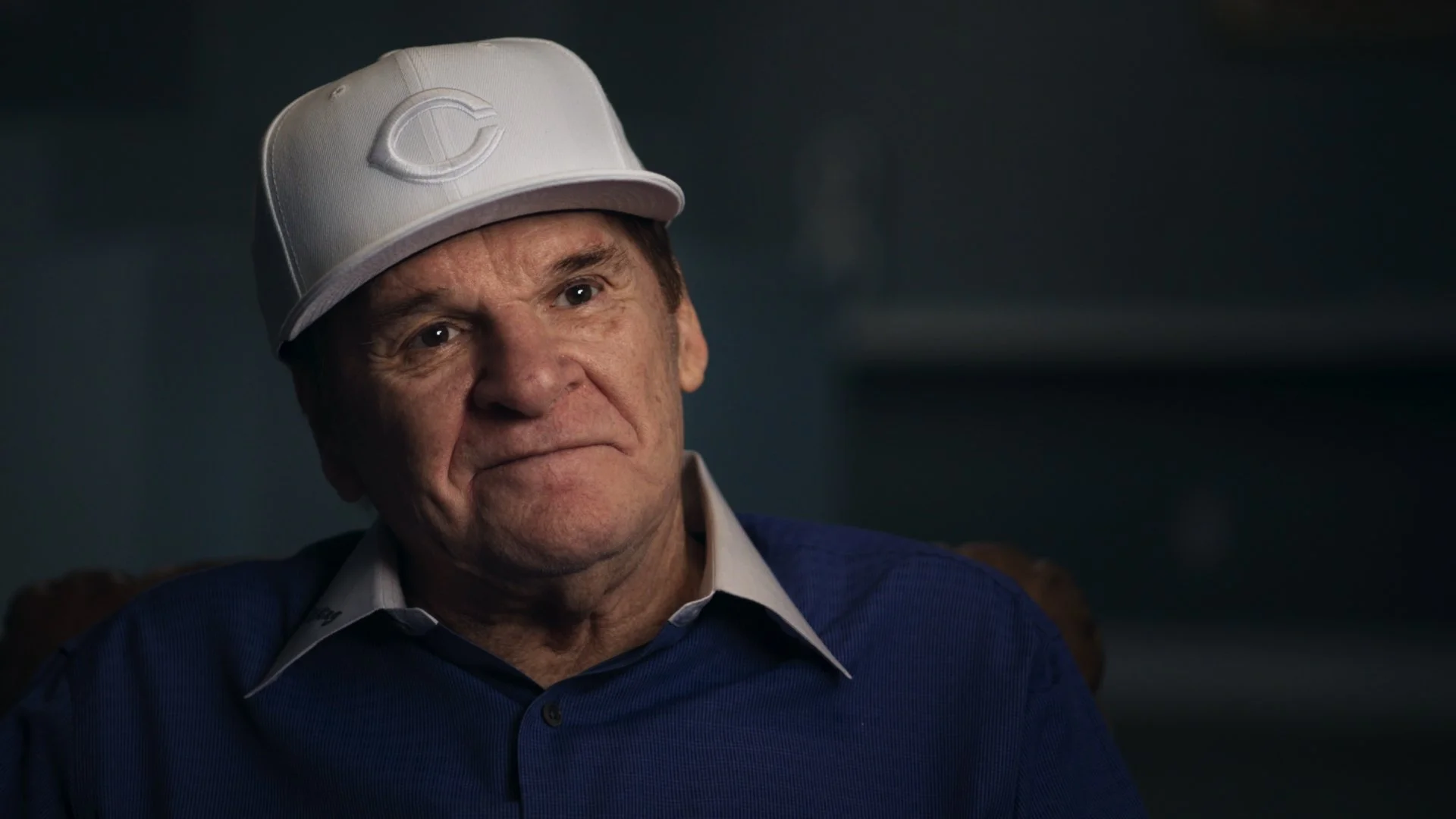Charlie Hustle & The Matter of Pete Rose: Portrait of a Shame Icon
By Liam Lacey
Rating: B-
At 83, former baseball star Pete Rose is still scrappy, still wears that hairdo that looks like Mo from The Three Stooges and continues campaigning to be in the Baseball Hall of Fame 35 years after he was cast out of the sport for gambling.
Those are the non-surprising takeaways of the four-part HBO documentary series, directed by Mark Monroe with J.J. Abrams as an executive producer. The series follows Keith O’Brien’s recent book, Charlie Hustle: The Rise of Fall of Pete Rose and The Last Glory Days of Baseball, which also featured Rose’s participation.
As Rose notes in one of the sit-down interviews — which are mixed with talking head and archival clips throughout the series — the people of his own age who condemned him are dying off, and people in their twenties and thirties only know him as part of baseball lore.
So why tell his story again now? The most obvious answer is, in the social media age — when we are constantly encouraged to pass judgement on the private, ugly secrets of publicly adored celebrities —Rose is an early example of a shame icon. He is a man who went from being heralded as the incarnation of baseball’s blue collar underdog hero to a sleazy cheater serving time for tax evasion.
Then there’s the current plague of sports gambling. Following a U.S. Supreme Court decision to let states legalize sports gambling in 2018, the integrity of pro sports has been jeopardized by a record number of suspensions of pro athletes betting on their sport. Can Rose’s example offer us any insight into cutting the Gordian Knot of sports and gambling?
The series does not address either of these issues in any depth which makes it mostly an exercise in nostalgia as well as an even-handed re-examination of Rose’s polarizing legacy. Along with Rose’s memoirs and evasions, we have lots of archival footage of cheering crowds and intermittently interesting talking head–commentary from sportscasters, journalists, teammates (and, unnecessarily, actor Chad Lowe, who grew up in Cincinnati as a Reds fan). There’s a lot of rehashing here, of glory moments when Rose’s aggressively exciting play on the field in the 1960s and 1970s, and his lifelong bromance with the media.
Over the years, “the matter of Pete Rose” as the series subtitle puts it, has produced quantities of column inches and hours of barroom arguments. If you measure sports achievement solely by athletic performance, there is an overwhelming statistical case for Rose’s claim to be in the Hall of Fame.
As he says in the first episode, “The Hall of Fame is all about stats. And I’m the stat machine.” Those include: Most career hits (4,356), most career games (3,562), most career at bats (14,053), most singles (3,215), most outs (10,328), three World Series, three batting titles, two Golden Gloves and a Rookie of the Year Award. And, as the commentators note, he did all this on willpower, more than his limited physical gifts.
But winning requires playing by the rules, and baseball has a hard rule about gambling that’s deep in the sport’s historical identity. In 1919, several members of the Chicago franchise conspired with gamblers to throw the World Series and were subsequently banned from baseball for life.
That moment of collective American shame is carried on in cultural memory through F. Scott Fitzgerald’s The Great Gatsby, W. P. Kinsella’s Shoeless Joe, and two films released around the time of Rose’s expulsion, Eight Men Out (1988) and Field of Dreams (1989).
Conventional wisdom suggests that, if Rose had been candid and repentant, blaming his behaviour on a psychological addiction, he might have found his way to the Cooperstown pantheon. But Rose, famous for iconic images of him sliding headfirst into the bases, is not a subtle individual. Not only did he show no remorse, he lied repeatedly, denying that he gambled on baseball for 20 years until he had a book to publish.
He’s shameless and as the series unfolds, the tawdriness of his character becomes more obvious. A sexual relationship with a teenage girl, the barely acknowledged child out of wedlock, and lots of testimony from his former acolyte and errand boy Tommy Gioiosa who claims Rose got him to traffic cocaine to deal with his gambling debts.
Then there’s that grating sense of towel-snapping vulgarity and rapscallion self-assurance which one sportswriter calls “Trumpian.” These include wince-worthy scenes where he calls a young female reporter “babe” when she asks about accusations of statutory rape against him. Or, when greeting an older female acquaintance, “You look good. Still got those jugs, don’t you?”
“They’re still part of me, yeah,” she responds.
Times and mores change but four hours feels like more time than you need to hang with a someone like Pete Rose, without being moved to either admiration or sympathy. He still earns an estimated million dollars a year from fans who feel the tug of hero worship, and regularly goes to Cooperstown during the Hall of Fame induction events to troll them and sell autographs.
In the first episode, veteran broadcaster Al Michaels offers a philosophical observation on the Pete Rose saga: “People say to me, ‘Don’t you think what happened to Pete was tragic? And I say, ‘No, tragic is a different story. The word I use for this is ‘sad’.”
Agreed to a point. Sports journalists too often try to treat personality disorders as tragic flaws and treat jocks as Greek demigods. At risk of underestimating the cultural significance of men who excel at smacking small balls with big sticks, I suspect even “sad” might be overstating it.
Charlie Hustle & The Matter of Pete Rose. Part 1 & 2 debut on HBO July 24 at 9 pm and 10 pm, the final two parts debut July 25. All four parts available to stream on MAX July 24 at 9 pm.



